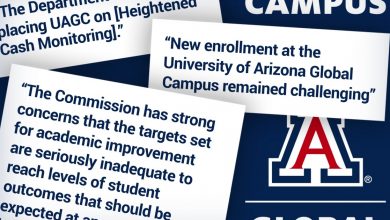For Biden’s Loan-Forgiveness Plan, a Flurry of Lawsuits, a Rollback, and a New Sticker Price

A lot has happened since President Joe Biden in August announced his plan to cancel up to $20,000 in student loans for millions of Americans — specifically, in the last week.
To recap, Biden’s long-awaited plan, which would fulfill a campaign promise, would forgive up to $10,000 in federal student loans for borrowers earning up to $125,000 annually, and up to $20,000 for students who received Pell Grants during college. An estimated 40 million borrowers are eligible for relief. Students and families rejoiced, while critics — primarily Republicans — argued that loan forgiveness was unfair and would mainly benefit the wealthy.
This past week, opponents of loan cancellation filed at least three legal challenges, and the Department of Education has already made at least one significant change to its plan. Here’s a look at what happened and what’s at stake:
Q: What are the opponents’ main legal arguments against Biden’s student-loan-forgiveness plan?
A: On Tuesday, a conservative legal group filed a legal challenge to the plan. Frank Garrison, an attorney with the Pacific Legal Foundation, is arguing that as a result of the student-loan cancellation, he would be required to pay state taxes on the relief amount. (Only a handful of states, including Indiana, where Garrison is from, appear to be planning to tax debt relief received under Biden’s plan.) Garrison said that he is already seeking student-debt cancellation under the Public Service Loan Forgiveness, which would not require him to pay state taxes. In response, a spokesman for the Biden administration tweeted, “No one will be forced to get debt relief. Anyone who does not want debt relief can choose to opt out.” It’s unclear whether the opt-out provision was the plan all along or came in response to the lawsuit. Regardless, on Thursday, the judge in the case denied Garrison’s request for a temporary restraining order and preliminary injunction on the basis that he could opt out of receiving debt relief. Garrison now has until October 10 to file an amended complaint.
On Thursday, six Republican state attorneys general (from Arkansas, Iowa, Kansas, Missouri, Nebraska, and South Carolina) collectively filed a lawsuit to block the plan, arguing that it is, among other things, economically unwise, “downright unfair,” and unlawful. “No statute permits President Biden to unilaterally relieve millions of individuals from their obligation to pay loans they voluntarily assumed,” the lawsuit states.
Finally, Arizona’s attorney general, Mark Brnovich, also filed a lawsuit on Thursday to stop the student-debt cancellation from happening. Brnovich argues, among other things, that because his office relies on other student-debt-forgiveness programs to recruit legal talent, widespread student-loan cancellation would hurt the ability of his office to recruit and “directly makes it less lucrative for lawyers to work for the OAG.”
Q: Did the administration change any details regarding which loans will be forgiven?
A: Arguably the biggest news related to the student-loan-cancellation plan this week was that on Thursday, the Education Department backtracked and said that borrowers with federal student loans owned by entities other than the Education Department, including Federal Family Education Loans (FFEL) and Perkins loans, could no longer qualify for debt relief under the loan-forgiveness plan. The move appears aimed at appeasing private lenders and other businesses that could suffer financial harm from the loan-forgiveness program.
Q: Will there be any exceptions?
A: The U.S. Education Department said on its website on Thursday that those with FFEL and Perkins loans who applied to consolidate into the Direct Loan program prior to Thursday would still be eligible for forgiveness and that the department was looking into alternative pathways for forgiveness for those who would qualify but had not yet applied.
Q: What’s the latest estimate of how much this is going to cost taxpayers?
A: The Education Department announced on Thursday that its student-loan-forgiveness plan, in which eligible borrowers could see up to $20,000 on student loans canceled, would cost an average of $30 billion a year over the next 10 years, or about $379 billion in today’s dollars, over the life of the program. The Congressional Budget Office previously estimated the plan would cost taxpayers $400 billion. Sen. Richard Burr of North Carolina is among those who have criticized the cost of the loan-forgiveness plan. “The president’s student-loan-debt scheme will cost taxpayers a staggering $400 billion — a cost that will be borne by working Americans who chose not to go to college or who responsibly paid off their loans,” Burr said after the CBO estimate was released. “Every American should be outraged by the president’s cynical ploy and by the real cost it places on those who stand to benefit the least.”
Q: It seems like there are a lot of moving parts. What should colleges tell students now?
A: Karen McCarthy, vice president for public policy and federal relations at the National Association of Student Financial Aid Administrators, said, “I do know that schools are likely going to get questions from borrowers asking like, ‘Is this going to happen or not? Am I actually going to get this debt cancellation? Should I bother filling out the application when it comes out in October?’ And my advice to borrowers and what I would advise schools is to say that as of right now, the department is making its plans to have the application roll out in October. You should sign up to be notified via their subscription service. … The department has started to do their outreach … to borrowers and people who had signed up for that email subscription. So we know that the department is moving forward and making plans that this will actually happen. And that would be my advice to borrowers as well. Assume that it is going to happen until there is a court decision or something that pauses it or makes it defunct or whatever. But for right now, we’re moving forward as if it’s going to happen.”






